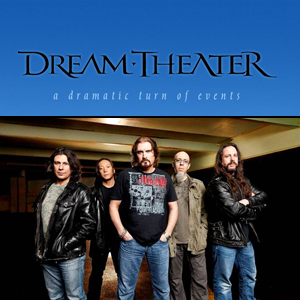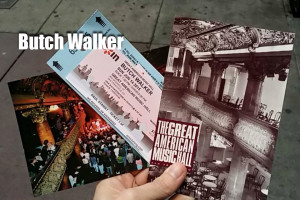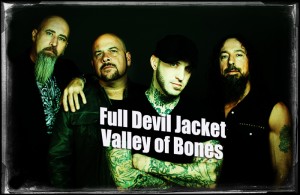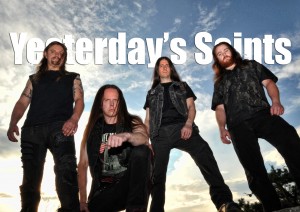Letting Go: A Conversation with Jennifer Knapp
24 min read
 When former Contemporary Christian Music artist, Jennifer Knapp, dropped the bomb that she was gay, it was like the shot heard around the world. Fresh off her tour with Derek Webb, I recently had the opportunity to interview Jennifer Knapp in between gigs. In her conversation with C6M, Jennifer spoke candidly about the controversy of coming out of the closet and being lambasted by the Christian media, what it was like to be the center of a controversy that grabbed national attention and finally what the future holds for her.
When former Contemporary Christian Music artist, Jennifer Knapp, dropped the bomb that she was gay, it was like the shot heard around the world. Fresh off her tour with Derek Webb, I recently had the opportunity to interview Jennifer Knapp in between gigs. In her conversation with C6M, Jennifer spoke candidly about the controversy of coming out of the closet and being lambasted by the Christian media, what it was like to be the center of a controversy that grabbed national attention and finally what the future holds for her.
As I thought about how I would approach this interview, I couldn’t help but realize that one shouldn’t dive into something like this without a certain amount of sensitivity to a person and their privacy no matter how public the person may be in our perception and also no matter how public their issue might be. In giving this particular interview my attention, I couldn’t help but be reminded of Derek Webb’s song, “What Matters More?”
You say always treat people like you’d like to be
I guess you love being hated for your sexuality
Music can be a fascinating teacher. No matter what I think I know – I’m constantly realizing that I don’t know enough. And maybe after reading this article, you might agree. If nothing else, after speaking to Jennifer Knapp the person, it proved that life certainly is complicated. And the only way to begin and end rhetoric that pretends to love our neighbor, we have to exercise the idea that love is an idea that does not come without effort and a willingness to go on a journey with someone as they share their lives with you. I hope you bear this in mind while reading this. With that said, please join us as Jennifer and I take a cue from Derek Webb and hopefully discover what matters more…
C6M: Are you currently on the road right now?
Jennifer Knapp: I will be tomorrow. I’ve got a few shows in the next couple of weeks. At the moment I am in Nashville sitting in the sun.
C6M: Well you were just playing with Derek Webb, correct?
Jennifer: Yeah, last week we rounded off about a two month tour with him and another gal by the name of Amy Courts. I got a good dose of getting back on the road after a good long while. And now I have a week off and now I’m heading out again.
C6M: Very cool. Okay, let’s talk a little bit about the past. You had quite a career by anyone’s standards. It wasn’t that long ago that you were opening for bands like Jars of Clay, winning Dove Awards and being nominated for a Grammy. And then you left the scene. Would you like to talk about what happened and what caused you to walk away? Was it the industry or the grind? Or both?
Jennifer: Yeah. Those are really good places to start. I was physically exhausted. I mean, I had worked really hard for about seven years. And I had been traveling close to 200 days of year for at least three or four years if not longer. The measure of success I’d have was always the security of the urgent. And there was really no time in that time to really take time and regenerate. I think that has a little bit to do with the entertainment industry, I don’t know if it’s particular to the Christian music industry or not because I’ve mostly just worked there. There was definitely that feeling that you know, if you got off the treadmill that you would lose everything kind of mentality and it was really a hard kind of blob to get through when I was just so exhausted. I really had lost the joy of why I began doing music in the first place. It kind of felt like the only reason why I was writing at all was because people wanted me to have records out. I was having trouble connecting to that organic place of why I started participating with music to begin with. I even think in particular, as far as the Christian marketplace too, there’ s a high expectation that you’re going to talk about your spiritual journey and when you have no time to even have a private life it’s really kind of hard to kind of navigate what that spiritual journey is other than just surviving. I got to that point of going, “Man, I’m living minute to minute in survival mode.”  And I just couldn’t do it anymore. So it was a real turning point for me to have to renegotiate whether or not I wanted to be a musician at all, let alone all the other things that came with my public life as a musician. You know sharing my life, my personal experiences, sharing my faith -whether or not I wanted to write in CCM music anymore. A lot of other things. So I really needed to have some time to kind of rest and regenerate and that took a heck of a lot longer than I really expected.
C6M: Let’s talk about your decision to “come out” publically – you’ve done quite a few interviews on the subject. Larry King, Christianity Today and others…how hard has it been to do those interviews?
Jennifer: Um…I would say on the one hand very hard. And on the other hand not hard at all. And I’ll start with not hard at all. I’ve been extremely blessed to have a very long time to find out who I am as a person. And to gain confidence in who I am as an individual, to build up relationships that are actually meaningful and based on reality and not like a public persona. I mean to really just find an organic sense of my own self and to be confident in that. And with that in hand, it made that process a little bit easier knowing that there are a lot of people asking about whether or not these rumors about me were or were not true. Well I’ve had a luxury of not living within the country and so I lived in a community if I walked down the street, nobody had a clue who I was. So I hadn’t and nor had I had the opportunity to live “closeted” – so in coming back to Nashville in starting to do the music thing again it was going to be pretty clear pretty quickly that I wasn’t living in the closet and that I was in a same sex relationship. So it felt like it was the appropriate thing to do to go “Yes this isn’t a rumor. This is actually true. So do with it what you will.” So the hard part comes in because I’m naturally a very private person. And in a very obvious private conversation that I knew I was going have to face in deciding to come back to music. So I worked a lot of that out before I even decided to pull the trigger and ever even coming back to the states or the music business. I had to know full well that whatever the controversy or the criticism that was going to come that I knew that I would be able to handle that. And it doesn’t mean that it doesn’t hurt. Or that it’s not personal. Or that there aren’t some challenges to sitting on national television and having somebody criticize the very person that you’ve become and the history of your art, your craft and your faith. Some really serious dialogs and friendships being called into question are never easy. But I think that helps a lot in having the confidence in knowing that I had the time to look back and see that I had fully participated as a public person, for as long as I had been a public person, honest and genuine about the person that I am and who I’ve been and there’s no exception to that rule now.
C6M: Right, well it is a little bit weird in some ways because before you were Jennifer Knapp the artist, or Jennifer Knapp the Christian artist, but now in some circles you are going to be Jennifer Knapp the lesbian – or maybe even Jennifer Knapp the person who is lost and needs finding. Did you anticipate that something this personal would not just get attention, but national attention?
Jennifer: Yeah, I gotta say I’m a bit surprised by the national attention. I suppose I’m a bit naïve because I don’t think I gave my historic audience enough credit for still being around. I somewhat thought that I was going to be entering anonymously back on the scene and that it might be a puff of smoke that went up in the air that went “Oh she’s gay.” And you know that everyone that was going to leave was going to leave and everybody that was going to stay was going to stay. And I didn’t figure that the numbers were gonna be, as far as impact and media swell around it, was going to be as huge. I mean I had friends of mine say, “Wow you have no idea how big this information on this is going to be, in particular in limelight of the Christian Evangelical community that is going to feel betrayed by the person that you say you are now and the person you have been.” And you can write the script on what a lot people want to say as far as the negative part. But I think the overwhelming surprise has been the amount of positive response. You see there’s a lot of people that really relate, no matter who they are, not just in issues of their sexuality, but just one way or another we find out ourselves that we can’t please people all the time. And the social systems that we have to navigate through (with) our families, through our work, through our jobs. It’s not just in areas of our sexuality but in very many different facets…
C6M: You bring up a very interesting point, which comes back to how you’ve been received. So how do you get back to a place where you let your music speak for you again?
Jennnifer: Well for me it’s pretty easy. I go out and I play. You know there’s media that you do. You can be well informed and well prepared to have the conversation that talks about the music. At the same time what I do as my job and for my career is that I’m a musician. I go out and play concerts and we talk and we have community and we meet and we chat and I listen and they listen. That’s what music is. It’s about community coming to those places and singing the songs. And participating in that community and that live event.  And in that regard nothing has ever changed. There’s hardly even been a bump in the road, but carrying on that dialog every day has felt extremely celebratory and rejoiceful in just being able to get back and play music and people there in the audience listening and singing. This is just such a great and wonderful dialog that it’s really very easy to leave what’s outside of the room – let it sit outside of the room. Whatever thunderstorms want to well up, we’re well in the shade and just having a good time. And I think that’s been a really great and wonderful truth I think that’s kind of come out of it. At the end of the day most people want to sing the songs that they want to sing. I’m no exception and many people in my audience are not any exception to that either.
C6M: Right, well it does get back to what you’ve been quoted as saying, several times already, that you aren’t a theologian. So is it a mistake to come to any person who uses any medium of artistic expression – even if that expression is faith based – is it a mistake to think you have all the answers? Because while music does speak to our souls, is it weird that people look to you or to the media or anyone in general for a spiritual response to problems- especially when you analyze things for what they are…it’s really just you and a guitar and some lyrics and now the media wants to label you or the people want to label you…and on top of that they’re interpreting your lyrics to a certain extent…
Jennifer: Sure. I would say I’ve had that experience through Christian music – profoundly – the idea that having a vulnerable conversation sharing one’s personal journey or process of faith becomes an endorsement of a particular viewpoint. And I think there’s probably no better example than to assume that when I talked about my faith that I towed the party line for Evangelical Christianity because that’s where my records sold. I think we should give ourselves a bit of a hip check and be honest in two ways. Like as an artist, am I going to be sensitive to the fact that I’m writing about my personal journey? Or am I going to be on some agenda…and be clear about which one of those is the case. For me historically as an artist, I found myself in Christian music because I was a Christian who is talking about my faith. Dealing with that on a very personal journey I think that is still the same way that I tend to function. I get very uncomfortable when anyone takes what experience I’m having in trying to find communion with others in navigating, as an endorsement of a particular path or particular way…
C6M: Right…
Jennifer: That’s not to say that I don’t have opinions on the matter. That doesn’t mean that I don’t understand the power and influence that being a public figure has in that, but I think it’s something that I’ve always taken very seriously to be careful about trying to get locked into a particular viewpoint. And I’ve tried very much to try and allow people to find a space to experience the life in a faith journey that they’ve wanted to experience. And not try to dictate how that should be. I’m not a big fan of it personally, I feel very uncomfortable with being asked to tell someone how one particular path should be done. Even right now there’s a huge assumption that for example that I’m known as a Christian and I’m known as a gay person (that I’ve become that) there’s this kind of reaction that people expect me to be this voice box for the reconciliation of the homosexual to the Christian church and all the arguments that come with it. And all I’ve ever said about it were that these are the facts about me. This is the spiritual journey I’m on. And yes this is my sexual orientation. Now this is my private journey. I’m not asking to dictate the terms of which other people are going to navigate those particular avenues for themselves. For me it’s more about creating a safe place for people to have that dialog and to understand that music is a place that a lot of us come to be able to share this thing – the heartache of this journey whether they be our faith, our sexuality, in our relationships no matter who they’re with, in our jobs, in our daily lives, whatever have you. I think that’s where a musician, at least in my particular viewpoint, is why I take the role of a musician very seriously in trying to create a safe environment rather than dictate the terms of some kind of social exchange.
C6M: That’s really interesting that you say that because it leads into the next thing that I was thinking about as I was listening to you talk about that – is that I listened to a few interviews and also watched a few and it was interesting how quickly people jumped on wanting to make that interpretation based upon what little that they do know of you. One of your interviews you were accused of being angry just based upon reading lyrics or hearing a particular song…
Jennifer: Sure
C6M: So when I listened to the album for the first time I was sort of expecting a huge change in style. Because I hadn’t heard anything yet, I was expecting Alanis Morrisette on steroids…
Jennifer: (Laughs)
C6M: Sort of kidding. But listening to the album and the spirit of your music I noticed a passion sure, but not exactly what you were being accused of…which I thought was interesting because it just goes to show how music in general can be interpreted differently by different people. So how much of you do you believe is in your music and ultimately are you surprised when someone comes at you and is accusing you of having different intentions behind the music that maybe weren’t in there when you were creating it?
Jennifer: Yeah that’s an interesting side effect. I’ve had to definitely come to terms in deciding to participate in music again having to deal with the fact that you can’t please everyone all of the time. There’s a certain point when you have to exercise your vulnerability in knowing who you are when you write a song that when you start to share that – know that people are going to get that from it what you want and interpret it. You know there are people scouring my lyrics right now for gayness and some kind of gay agenda and I’m just living my journey. But at the same time, I realize that people do that and they interpret that and that’s freely up to them. If I can go to the long journey that it takes in building a friendship…
C6M: Right…
Jennifer: I think we forget sometimes in our modern culture and in the short attention span type of sound bite mentality that we think we know the whole story of a person or who they are and the truth of it is when we’re actually starting to talk about our real communities where we live, the relationships that we have and our daily lives…it takes a long time to get to know somebody.
C6M: Oh sure.
Jennifer: In a personal relationship with a lover, a partner, and husband, a spouse, or whatever… these are long journeys that you take together. There are people that I’ve known for ten years or greater and even relationships with my family where we’ve known each other our whole lives. And we still in that journey where we find out new things and wonderful things about each other…I think you have to look at the long term conversation that artists are having. I think there artists going out and making records for the moment and aren’t going to be creating or crafting art for long periods of time…and to begin to make assumptions over a moment or three and a half minutes is really difficult. I think you have the opportunity if you choose to enforce it to really become a part of the story or how that journey translates for you…I think that’s the part of music that’s a real blessing that we can have the community where we can encourage each other on the path that we walk rather than dictating the points in which we should be trying to navigate that.
C6M: Right, isn’t that what it’s all about when you get down to it, as an artist, to have your music mean something to someone and in that sense you’ve done your job, right?
Jennifer: Well it is a gift. You know, I can write for myself and it’s really great. No matter what the gift is that you’re offering, let’s say that you were giving someone fifty dollars. If you’re giving that with your heart and that’s what you mean. And that fifty dollars that you’re giving is not really up to you to always dictate the terms on how that fifty dollars gets spent.
C6M: Right…
Jennifer: And I look at it the same way with the music. I mean, I know what it means to me. For me some of the songs are chameleons – they’re constantly changing on a given day, it resonates with me in a different way than when I sat down to write it. So it’s really difficult for me to try and predetermine what that should mean for someone else outside of me as a listener. If it’s a gift to you and it moves you and you want to be there and listen to it…it’s there. And if you don’t, there’s no personal offense to me if you don’t like my music. I think it’s fantastic for people that go to the places that they really do find resonance with their own journey.
C6M: Well let’s talk about that and the journey…and one of your angrier songs. “Mr. Gray.”
Jennifer: (Laughs)
C6M: I’m sorry, I really did think that the interview (in Christianity Today) was just so ridiculous.  But let’s talk about “Mr. Gray.” I thought that listening to the album that there were a few songs that stood out. But this stood out because there are so few songs that resonate after the song is over to cause you to think. And the thing that I took away this and the impression that it gave me was that there was a word you used about what “mercy” was. Do you want to talk a little bit about that song and the creation of that and what you were intending to say with this very lovely story?
Jennifer: Yeah, I love that song in particular because it really reminds me of where I grew up. You know I grew up in a very small town and a very simple community where – I don’t know – I have very normal people in my life. I have a very normal family. And we deal with normal family things, you know? I think whenever I go home, I’m very much struck by the normalcy of it all. And I sometimes get wrapped up in the labels of who I’m supposed to be or what my expectations are. But I think when really I look at the more anonymous parts of who we get to be, but that’s kind of where it resonates with me. We’re all just normal people trying to navigate our way through this life. And it takes a good deal of grace when we’re looking at people that we don’t understand who are having experiences that are really difficult. And this particular narrative, in “Mr. Gray,” is about a guy who is just trying to make ends meet…we get all hyped up especially when we talk about our modern culture and the things that we read in modern media and we talk about sex because none of us have it and all of us need it and we talk about money and wealth, forgetting moments of emotional poverty that we have and the struggle that it is to be and find ourselves through the mundane elements of our lives. That’s where really I gravitate to is the conversations that inspire me on a regular basis with my friends, with the audience members that we spend more time talking to after the show sometimes than having done the music. I really love that center piece in being able to show the nuances of just the simple people that we are just trying to move forward. And that we need mercy. It’s not easy to figure out ourselves let alone having to run that gauntlet of everybody else telling us who and how we should be and whether or not we should be given a gift. The “Mr. Gray” of that song is definitely somebody who’s just been a normal Joe and he’s minding his own business and all he’s asking is for a chance to be himself. You know, I flipped that around, and I know it’s being sung in the 3rd person of “Mr. Gray,” but I think that all of us relate at some level to that…
C6M: Absolutely. Well it feels like a very personal record. How long did it take to you write the material? You had obviously been away for a while, so when did you know that you had written enough material that it would eventually constitute enough material for you to create a whole album?
Jennifer: I was six or seven songs in to getting back and writing when I started to actually start thinking about a record. Mostly it was just an exercise, personally, just getting connected to music. I wasn’t thinking and refused to think about doing a record. I just wanted to write again. And just wanted to pick up my guitar and play. I think as those songs started to connect and resonate in a larger story and even getting back the sense of joy that I had in music and the struggle and the joy in finding that struggle there…it was kind of a natural thing at that point to start looking towards sharing that…its been a real blessing to actually have that organic process, rather than feeling that I have a record contract. It was just really nice to have the personal practice of being a song writer rather just saying, “Oh well, yeah, let’s put an album together.” And then sort of let the record sort itself out.
C6M: Did you anticipate that it wouldn’t be a “Christian” album by definition of the industry when you were creating this? Was there any idea at all when you were writing the music that it would just be in a whole other industry – was that entering your mind at all in creating this?
Jennifer: Um yeah. I had some very strong suspicions that this wasn’t going to be a Christian record, quote unquote. I was just sitting down and writing. And in some respects I actually had to somewhat learn how to write again because there was certain pressure that I felt like I was being literally required to write about my faith at every given turn. There were songs that I’ve found that I would start to manipulate to get to a point so it could be on a Christian record. And it felt somewhat disingenuous to go through that process of trying to make it be a Christian song when maybe it was a normal song to begin with. But at the same time, I’m thinking it was a real challenge to see the evidence of the faith in my life. So I don’t necessarily regret the process I’ve been through. But this time through, I really somewhat had to get away from, I don’t want to call them tricks, but there’s certainly a perspective that every time I sat down to write, “What does it say about God? What does it say about a past theological message? Is it going to have a scriptural reference in it? Is it going to need an overt scriptural reference?” And it’s exhausting when all I wanted to do is just express myself. And not worry about what the over arching ramifications were into the spiritual well grounding. Not that I don’t take those seriously or are important, but to get the ball rolling or just to get it moving was a part of that struggle. It’s just like being atrophied and not being able to move. You know you don’t care about how sexy your walk is, you just want to get back on your feet.
C6M: Sure.
Jennifer: And that’s kind of where this process was at. So through that, I kind of really understood that this wasn’t going to be a record about Christianity but I was pleasantly surprised that the elements of faith and of my experience showed up in it. And I was actually quite relieved to figure out that even if I didn’t personally go out of my way to prove it that it was still evidenced there. So it was really a nice little bonus, I think for me personally.
C6M: I think it was very evident…I don’t think anyone can divorce themselves from who they used to be. You’re sort of a conglomeration of your whole entire life. So the evidence of who you are as a person bleed through the lyrics. And it’s also a very eclectic mix of emotions, styles and stories. There’s also the stamp of who you are that is undeniable. But when it’s all said and done, and I don’t know how much time you’ve had to reflect on the album as a whole yet, but are you proud of it?
Jennifer: Oh man…with a great deal of relief, proud. I don’t know if that makes sense. I kind of went through these stages. There’s the stage of just getting on the bicycle again. And then there’s the stage of getting back and doing live performance again. And then there’s the sheer terror of going, “I don’t know if I can make a record anymore. Or I don’t know if I can sing. What am I doing?” And normally my process is to write and then I share these songs while I’m on the road…and then I go into the studio…and I didn’t really have that going into this record. So I learned that. And I have that experience for the first time in sitting down and in recording these songs. And it’s a really cool thing to be able to have that opportunity to record your music and to share it and to create something out of nothing. And it’s really stunning to not take that for granted. And to get to that point, yeah, it was an immense sense of relief. And pride, not from the sense of, “Wow I’m so cool, look what I did.” But wow I really faced a lot of my fears and really took a real struggle and a real risk in my vulnerability in getting back to music and feeling like I have something that was true and honest and wasn’t necessarily manufactured for the sake of “I just wanted to be a rock star” or “I wanted to make money.” I really felt like I accomplished something…in expressing why we play music, why people write, why people wanna listen to this…I think that was in the end to me really gave me a lot of hope in continuing forward. I think that anything less than that I would have been extremely disappointed in feeling like I was just manufacturing a record for people to buy. That’s kind of why I left in the first place and it was a real challenge to enter into that fuzzy world between art and commerce again. And I really was just afraid I might be caught back up on that same treadmill again. It was a real relief to not necessarily come out of that experience feeling that way, but feeling like I had something that really meant a lot to me personally.
C6M: So where do you see yourself as we move forward from here?
Jennifer: Yeah, the world is a little bit my oyster. I mean it’s a different climate in the fact that I’m doing this record independently. We’re just living in the moment right now. I mean this record is just now getting its foot in and it’s just now getting out there. And the story about how it’s going to impact the greater audience around us is the part of the fantastic part of it. You know, you have that time to let it ruminate and let people come and join in the song and celebration of it. So I’m really looking forward to that in the next year. And if it’s a year or two years, it’s great. I have the added bonus of not being under contract…so I can just live in the moment and enjoy the art of the moment which allows me a lot of time to sit down and reflect and create new music along the way. It’s a lot more organic process for me right now that I’m really enjoying that I didn’t necessarily have four and five years into the previous version of my career.
C6M: Thank you so much for talking to us. We look forward to following how things go for you on the road. Good luck with the album.
Jennifer: I really appreciate your time as well.
We want to thank Jennifer for her candid interview as well as her honesty and insight into her mind as an artist who continues to take her journey through life seriously. You can find information on how to purchase Jennifer Knapp’s new album, Letting Go through her website, http://jenniferknapp.com. Don’t forget to follow her on Twitter @Jennifer_Knapp and let her know that Paul sent ya.







